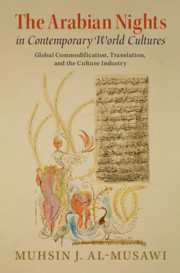 The Arabian Nights in Contemporary World Cultures
The Arabian Nights in Contemporary World Cultures Book contents
- The Arabian Nights in Contemporary World Cultures
- Frontispiece
- The Arabian Nights in Contemporary World Cultures
- Copyright page
- Dedication
- Contents
- Figures
- Acknowledgments
- Introduction
- 1 The Arabian Nights
- 2 The Scheherazade Factor
- 3 Engagements in Narrative
- 4 The “Hostile Dynasty”
- 5 The Archaeology of A Thousand and One Nights
- 6 Signatures and Affiliates
- 7 Decolonizing the Arabian Nights?
- 8 Invitation to Discourse
- Book part
- Select Bibliography
- Index
4 - The “Hostile Dynasty”
Rewriting the Arabian Nights
Published online by Cambridge University Press: 17 August 2021
- The Arabian Nights in Contemporary World Cultures
- Frontispiece
- The Arabian Nights in Contemporary World Cultures
- Copyright page
- Dedication
- Contents
- Figures
- Acknowledgments
- Introduction
- 1 The Arabian Nights
- 2 The Scheherazade Factor
- 3 Engagements in Narrative
- 4 The “Hostile Dynasty”
- 5 The Archaeology of A Thousand and One Nights
- 6 Signatures and Affiliates
- 7 Decolonizing the Arabian Nights?
- 8 Invitation to Discourse
- Book part
- Select Bibliography
- Index
Summary
Chapter 4 goes along with Borges’s reading of a dynastic translational spectrum of anxieties. A forum for discussion initiated by Galland has been involving a worldwide cultural scene with anxieties that are expressed in reeditions, abridgments, authentication processes, claims to fidelity to an original, though disputed, text, and unexpurgated or collated editions. The discussions erupted since the advent of Galland’s Thousand and One Nights set the scene on fire: accusations and counter charges over three centuries signify the existence of the Nights in world culture as a knowledge consortium that brings on board theories of translation, cultural interventions, and conversations and discussions among the most prominent intellectuals, artists, and fiction writers. Illustrators, film industry producers and directors have been participating in this dynasty, simply because they are part of one translation or another, though on certain occasions they stand on their own. If political dynasties of rulers are often biologically related, the Nights in Europe has its textual dynasty: no translator or editor could ever get free from Galland’s enterprise, not even Muhsin Mahdi who produced Galland’s Arabic manuscript after only portions of it appeared in print early on in the twentieth century. More important is the fact that the Nights was once a platform in the ongoing racial philological divide in language families, Aryan and Semite. New philology found in the Nights a viable means to discuss origins. The divide did not die, and it is reborn in stock images, value judgments, and essentialisms.
- Type
- Chapter
- Information
- The Arabian Nights in Contemporary World CulturesGlobal Commodification, Translation, and the Culture Industry, pp. 132 - 170Publisher: Cambridge University PressPrint publication year: 2021
